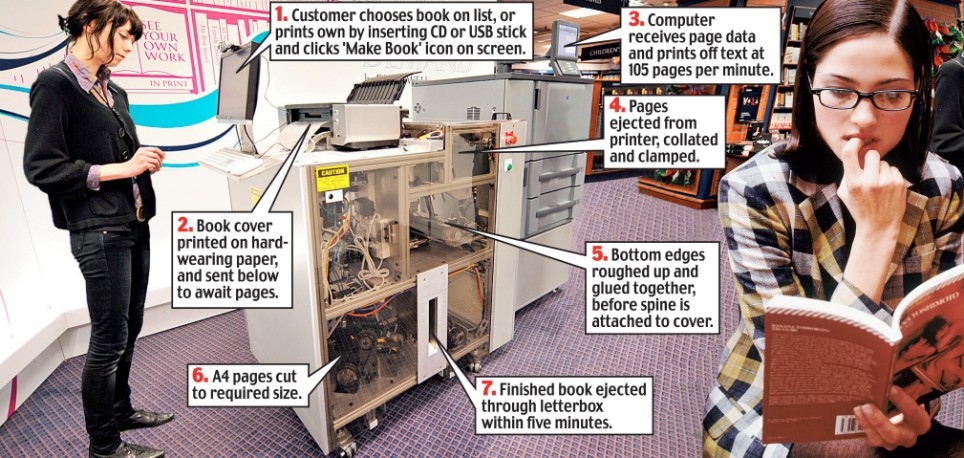The Shelfless Bookstore
What is the difference between a traditional bookstore and an online bookstore? You could say it’s in the opening hours, the delivery time and number of employees, but let’s focus on one of the main differences. A traditional bookstore is physical, it is placed in a certain location and has a certain amount of square meters. Their is a limit on how many books can be placed inside the store. An online venture does not have to deal with this restriction. Clay Shirky has a perfect aphorism for this: ‘there is no shelf’. This has been a great advantage of the digital stores. More than once have I, after visiting numerous bookstores without success, retreated to the online world to find and buy a book.
Online stores have an infinite room of space for their books. Of course, it still has to exist somewhere psychically but you can store a lot more books in a warehouse than in a bookshop. While traditional bookstores return unsold books to the publishers after a certain amount of time, and thus remove books from circulation, online bookstores can keep selling them without loss in their system. The online bookstore also has an advantage of scale: they can more easily aggregate dispersed audiences. When your audience is big enough, the sales of unpopular, low-demand books start to add up. The overall turnover of these less popular items might even exceed that of more mainstream books. This concept was dubbed the ‘long tail’ phenomenon by Chris Anderson.
In most cases, online abundance beats offline scarcity. There is, however, a new player in town. An offline, localized player who has managed to discard the issue of offline scarcity. It is called the Espresso Book Machine (EBM). The EBM is a machine that prints, binds and trims a book on demand. According to their website the EBM ‘replaces the centralized supply chain for the distribution of books – essentially unchanged since Gutenberg – with radically decentralized direct-to-consumer distribution.’ Consumers may choose a book from the EBM’s database (currently holding around 4 million titles) or turn their own text into a paperback book. The database has access to commercially available books and public domain titles (via the Internet Archive and Google Books). A book printed by the EBM will probably be slightly cheaper than a traditional printed paperback book.
The EBM is a creation of On Demand Books, a company that is founded by Jason Epstein and Dane Neller. In a recent article, Jason Epstein emphasizes the importance of tangible objects and highlights his concerns regarding the fragility of digital content.As an example he refers to the 1984 Amazon Kindle incident, Amazon recently deleted purchased e-books from customers’ Kindles. The irony is that the books were George Orwell’s 1984 and Animal Farm. Naturally, the likelihood that this would happen with physical books is non-existent. There is no way, that Amazon will knock on your door asking to return a certain book that you bought at their store. In the digital environment, there is no knock. It is for this reason that Epstein suggests a new business model for e-books:
If I were a publisher today I would consider a renewable rental model for all e-book downloads—the “lending library” technique of the Depression era—that more accurately reflects the conditional relationship, enforced by digital rights management software, between content provider and end user.
So, when talking about book preservation, physical publishing has advantages over digital publishing. The EBM has some benefits that traditional publishers do not offer. Epstein notes that the EBM holds the promise of prolonging the life expectancy of a book because it can deliver out-of-print books. It is also more environmentally friendly because it does not require transportation from one point to another. On top of that, no unwanted books are destroyed. Because the print is on demand, there is no need to burn or recycle unsold books.
The EBM promotes a decentralized way of printing, a way that might be more efficient and effective than traditional publishing. Could this machine create a new competitive edge for the traditional bookstore against the Amazons of this world? The ABC bookstore in Amsterdam has bought a copy of this machine and will launch the new service on December 11th. Personally, I am quite excited about this and expect that I will be exiting the bookstore next month with a warm book in my hands. It gives a new meaning to the sentence: “Hot off the Press!”.
References
Clay Shirky, Ontology is Overrated: Categories, Links, and Tags (2005).
Chris Anderson, The Long Tail (2004). Wired.
Jason Epstein, Publishing: the Revolutionairy Future (2010). The New York Review of Books